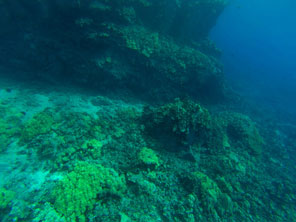Camera Project
There is a growing problem of ocean-bound debris, overfishing in remote, restricted areas and the inherent impact on the environment from these and other activities. Monitoring isolated locations in vast areas, such as the oceans of the world, has become a costly and difficult task.
The Jupiter Research Foundation is developing a means by which Wave Gliders can be outfitted with camera arrays. The initial system would incorporate two camera arrays, one providing a 360-degree view from the surface and the other a similar array from the glider sub.
Initially, the glider will send low-resolution pictures periodically from each camera, progressing to motion video. Further developments would include motion sensing equipment to detect and record any marine animals that might happen upon the glider at sea or switch to a high-resolution camera for that once in a lifetime shot.
Preliminary testing of cameras mounted at minus 22' on the glider
Wave Glider camera checks coral reef
Wave Glider tests a GoPro camera and captures a fleeting manta ray
For more about this project, please contact us at autonomous-surface-vehicles-info@jupiterfoundation.org






